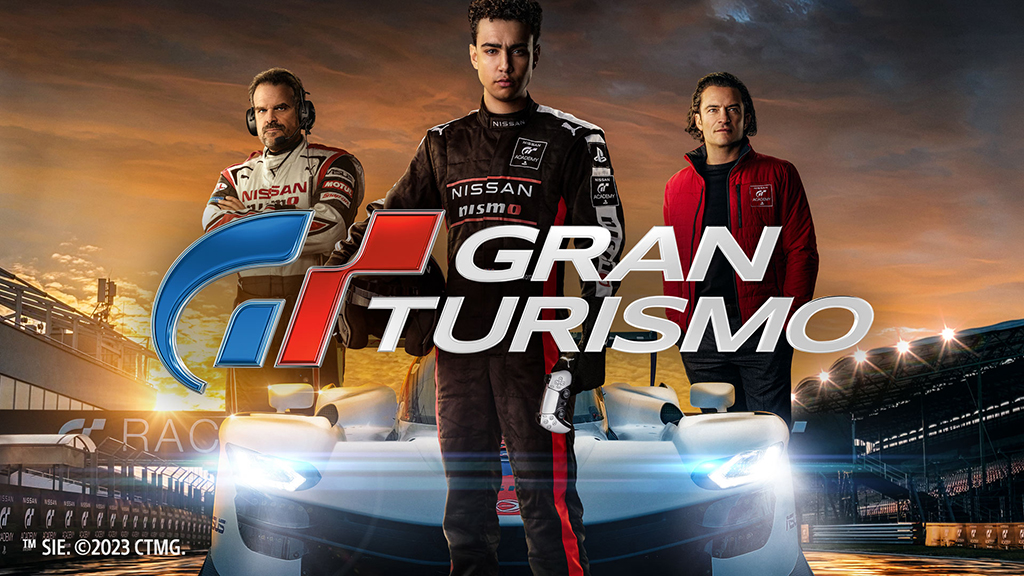By Bob Garver
Like its main character, “Gran Turismo” fights hard to overcome the stigma of its association with a video game. Video game movies have taken some big steps lately, both creatively and commercially, with efforts like the “Sonic the Hedgehog” series and “The Super Mario Bros. Movie,” though the genre still lacks that one ceiling-shattering creative standout. Unlike its main character, “Gran Turismo” ultimately can’t quite pull it off. It’s close, it really is, but this movie comes just short of being the first video game movie to earn my recommendation.
Archie Madekwe stars as Jann Mardenborough, a gamer struggling to find his place in the world. He’s not interested in pursuing an education or a career, much to the consternation of his father (Djimon Hounsou). The only time he feels like he’s accomplishing anything is when he’s playing the “Gran Turismo” racing game, but there’s no future in that… or is there? Nissan executive Danny Moore (Orlando Bloom) has a plan to take the best players from around the world and put them behind the wheel of real race cars. Jann qualifies, and thus his underdog journey begins.
Jann trains under the harsh tutelage of former racer Jack Salter (David Harbour), a mentor that lost his own nerve for racing after a fatal accident. Not only does Jack not believe in Jann, he doesn’t believe in the whole concept of simulated racing translating to actual racing. Many other characters hold the same belief, saying that real racing isn’t the same as gaming and that it’s too dangerous for this type of experiment. I’d say it becomes monotonous, but the hazards of racecar driving can’t be overstated.
We follow Jann as he goes through a crash-course (for lack of a better term) in racing at a makeshift academy where he needs to finish in the top five of his class, to a qualifying circuit where he has seven races to finish in at least fourth place to earn a contract, to the 24 Hours of Le Mans race (yes, the one from “Ford vs Ferrari”) where he has to finish at least third or sim racing will be shut down forever. Along the way he gradually earns the respect of his peers, naysayers, and most difficult of all, his family.
It’s mostly typical underdog sports-movie stuff, without the necessary feature of much in the way of traditional athletics. I know racecar drivers are real athletes, and I’m not saying otherwise, but nothing changes the fact that the actors can always be filmed vibrating and breathing heavily from the driver’s seat while the car, driven by a someone else (in this case, it’s often the real Jann Martenborough), is what’s seen in the most tense sequences. On the other hand, Harbour turns in an excellent performance and sports movies are as popular as they are for a reason – because it’s easy to get caught up in them – including this one.
I was on the fence about “Gran Turismo.” I was tempted to say that this movie just barely breaks the streak of there never being a “good” video game movie, or that it doesn’t really count as a video game movie because the movie is more “about” the game than it is an adaptation. But then I learned of a deal-breaker: this movie completely misrepresents a horrific real-life event that takes place at the end of the second act. In the movie it takes place at a time when a setback needs to happen so Jann has an obstacle to overcome going into Le Mans. In real life, it took place two years later. This certainly isn’t the first time in movie history that real-life details have been fudged for dramatic purposes, but this one is so blatant and was called out so immediately that it really makes me question how much respect the filmmakers really had for their subject. And when I start questioning that, it makes me question how much respect they have for their audience.
Grade: C
“Gran Turismo” is rated PG-13 for intense action and some strong language. Its running time is 134 minutes.
Contact Bob Garver at rrg251@nyu.edu.





